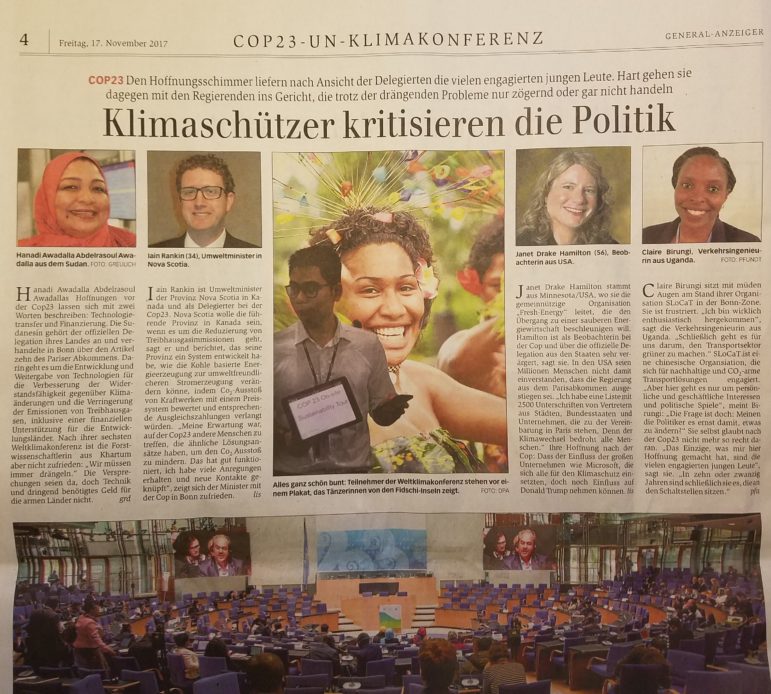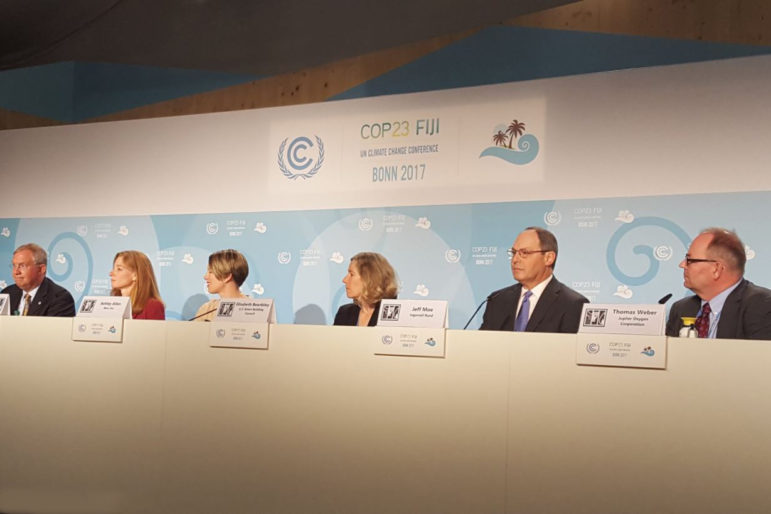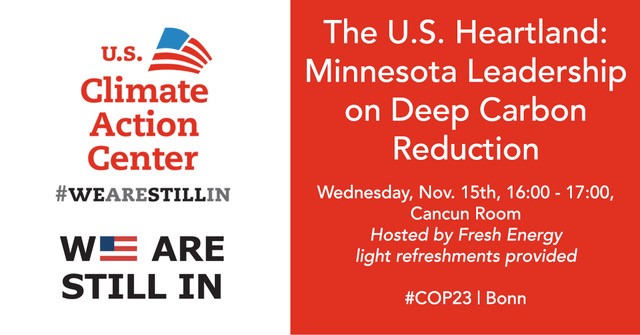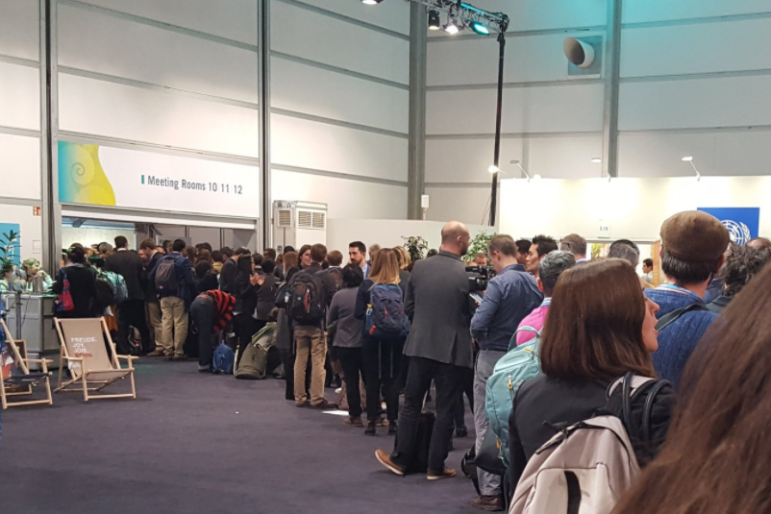
November 20 | Summary dispatch from the Global Climate Summit in Bonn
I’m writing from Bonn, Germany, where this year’s international climate talks (COP23) have now concluded. Fresh Energy sent me to Bonn to tell the world the stories of the Minnesota partnerships that have built a clean energy economy that is already employing 57,000 Minnesotans in rural and urban communities. We also wanted to keep watch over the Trump Administration’s diplomacy at the climate summit.
Recent news on global emissions has been sobering, with a yawning gap between the emissions trajectory need to keep global temperatures within safe limits and the actions to which countries have committed. But many countries are moving ahead with the implementation of their national commitments. Britain and Canada led a group of 19 nations that have committed to phase out coal power in their countries. Syria has now officially signed onto the Paris Agreement, isolating the United States as the only country with announced intention to leave that landmark global agreement.
In this message, I want to share highlights of Fresh Energy’s work at the climate summit.
Engaging with the U.S. Delegation
Following President Trump’s announced intention to withdraw from the Paris Agreement, the U.S. severely limited its involvement in the climate summit. You may have seen the news that civil society, including Fresh Energy, was shut out of the only official event hosted by the Trump Administration (a shameful promotion of coal). I was relieved to see that over the two weeks the U.S. delegates played a low-key role in Bonn, providing some technical expertise but without a political agenda. During the high-level days of negotiations, I was part of a small group of civil society organizations that met with members of the official U.S. delegation. We spent an hour with David Banks, a top advisor to President Trump on international energy issues, and Francis Brooke, a top domestic advisor to Vice President Pence. I’ll be sharing my impressions of that meeting on Fresh Energy’s November 28 webinar.
Telling Minnesota stories of deep carbon reductions on the global stage, alongside business and government partners
Fresh Energy created and moderated a public event, Heartland Climate Action: Minnesota Leadership on Deep Carbon Reduction, that drew a packed crowded on November 15 and was livestreamed. Our excellent speakers included representatives from Governor Dayton’s office, the Minnesota legislature, Target, and the Science Museum of Minnesota, all of whom shared Minnesota success stories of carbon reduction achievements. You can watch the recording here.
We told the global audience that Minnesota is known as the North Star State, and that our “North Star” for climate action is counting the tons of carbon emissions we cut. We know that’s the only metric important in the atmosphere, and we seek to cut carbon deeply to help those people most impacted now by global warming.
There’s strong determination among states, cities, businesses, and civil society on deep decarbonization, and Minnesota is the leading actor in the heartland of the US. Indeed, the commitments secured in our state’s power sector will allow us to achieve emissions reductions about three times the levels in the Paris Agreement. When the Trump Administration refused to pay for pavilion space in Bonn—for the first time in 23 years—private philanthropists stepped up and funded the U.S. Climate Action Center, where Fresh Energy and partners showcased our achievements.
Fresh Energy showed the world that U.S. states—including Minnesota—are continuing to lead on climate change. State-level climate action is benefitting our economy and strengthening our communities, while reducing air pollution and improving human health. Minnesota’s deep carbon reductions are showing the nation and the world that ambitious climate action is achievable.
Getting Minnesota climate action stories into the German media
Our highest priority audience is other nations, who need to know that U.S. states are taking action that exceeds the goals of the Paris Agreement. Check out the Bonn newspaper story above featuring me.
Reporting out our work using video from Bonn
Fresh Energy worked with the Science Museum of Minnesota to create videos of Minnesota leaders responsible for big carbon reductions, and pushed those videos out via social media. You can watch my five-minute interview below.
Sign up for the November 28 webinar to learn more about the results of the official climate work of nearly 200 countries. I will also outline concrete next steps for Minnesota, and actions Minnesotans can take to help.
November 17 | Further, faster, together on climate action
Late yesterday at COP23, during the high-level phase of the work, I had the opportunity to meet for an hour with leaders in our U.S. delegation. Our small group of U.S. nongovernmental organizations had questions and recommendations for the delegation representing us in the global negotiations, including for actions post-Bonn. I’ll be summarizing the results of the global climate summit on a webinar on Tuesday, November 28 at noon CT. Join us to learn about next steps and how you can help make climate progress that goes deeper and happens faster.
Fresh Energy’s Minnesota showcase event this week, U.S. Heartland Climate Action, was lauded as a defining example of partnerships linking the private sector, policy makers, and scientific and energy nonprofits, aligned on moving forward faster with deep carbon reductions. People from around the globe told us in Bonn that Minnesota’s carbon reduction successes inspire them by demonstrating how non-federal actors in the U.S. can scale up climate action at the pace needed to exceed the Paris Agreement. The leaders of the United Nations Framework Convention on Climate Change have made it clear that climate action is not just about government, but about working together in coordination to achieve more ambitious greenhouse gas reductions, on an expedited timetable.
People from the private sector, nongovernmental organizations, and civil society will be the leaders in moving further, faster together on climate action.
As I told our global audience in Bonn: Minnesota is the North Star State. On climate action, Fresh Energy focuses on the North Star for action: actual achievements in deep carbon reduction. Fresh Energy will continue to push forward in every ways to inspire a greater sense of urgency and drive more on the ground action.
November 16 | Unstoppable and irreversible: business achievements in carbon reduction

Businesses across the U.S. and around the globe are making deep carbon reductions because climate solutions often save companies—and their customers—money. At COP23, the Business Council for Sustainable Energy invited companies to describe their climate achievements. These businesses are here in Bonn because they “want a constructive outcome for this global climate summit, one that’s focused on increased ambition.” Higher ambition, in the lingo of international climate negotiations, means deeper greenhouse gas emissions reductions on a faster timeline. Deeper, faster climate action is exactly what Fresh Energy promotes, and I listened closely to their stories.
The business case for climate action is strong
Microsoft at COP23 announced an aggressive new target: to cut greenhouse gas emissions 75 percent by 2030, the carbon equivalent of all the energy used in Rome, Italy. As a result, 10 million metric tons of CO2 will not go into our shared atmosphere. Microsoft sees their new commitment as cutting costs and helping the U.S. and world meet the Paris Climate Agreement.
Mars, Inc., an American global manufacturer of candy (M&Ms), pet food, and other food products, has made a commitment to using 100 percent renewable energy in its operations around the globe by 2040. So far on its pathway to that goal, Mars is already saving money on energy. Mars noted that the company’s commitment to climate action has helped them uncover ”really clever ideas that lead to energy efficiency solutions.”
Ingersoll Rand, whose business include heating, cooling, and automating buildings, is on track to meet its commitment to reduce the greenhouse gas emissions of its portfolio 50 percent by 2020. To date, Ingersoll Rand has saved 6.7 million metric tons of greenhouse gas emissions, or the equivalent of operating 700,000 American homes. Such leadership in cutting carbon in buildings is critical for meeting global climate goals. The company’s Jeff Moe noted that 40 percent of all greenhouse gas emissions come from buildings, and 40 percent of those emissions relate to heating and cooling—in low-income nations, up to 80 percent of the energy used in buildings is for heating or cooling.
In addition to building an electricity portfolio that is today 70 percent carbon-free, PG&E Energy is aiming to be a climate solutions company. Like Fresh Energy, PG&E is looking at using a decarbonized electricity grid to power other parts of our economy. A company representative noted that PG&E has identified investment in grid modernization as key to attaining climate goals, including the goal of clean electrification of our transportation system.
Business commitments to climate solutions translate into growth of good-paying jobs. Governor Terry McAuliffe of Virginia noted that in the past three years, Virginia has added 77,000 energy efficiency jobs. That compares very favorably to the roughly 1,700 coal mining jobs in that state.
We Are Still In campaign builds momentum
The We Are Still In campaign is the largest and broadest cross-section of the U.S. economy ever assembled in pursuit of climate action. Over 2,500 leaders from America’s state and city governments, businesses, and colleges stand by the Paris Agreement and are committed to meeting its goals. More than 1,700 businesses from every state are helping to accelerate America’s transition to a low-carbon economy and more are joining every day. These businesses recognize the opportunity presented by the clean energy revolution, and they are taking action now!
The bottom line
Business action to cut carbon is unstoppable and irreversible, as it helps corporations’ bottom lines. These impressive, deep climate actions cannot be undone by President Trump or Congress.
November 15 | Minnesota panel showcases deep carbon reductions
Today, a group of Minnesota leaders got on the stage for the first-ever panel at the global climate summit featuring Minnesota business, nonprofit, science, and policy leaders in front of a packed audience.
The panel event included a video welcome from Lieutenant Governor Tina Smith who showcased Minnesota’s great success in achieving carbon reductions while cutting energy costs and growing clean energy jobs. Panelists discussed Minnesota’s path forward to achieving even deeper science-based carbon cuts in Minnesota, including the role of efficient buildings, renewable energy standards, and collaboration and innovation across state and national boundaries.
Fresh Energy was excited to host this great event and we thank our great speakers: Stephanie Zawistowski of the Office of Governor Mark Dayton, Lieutenant Governor Tina Smith, Melissa Hortman of the Minnesota House of Representatives, Patrick Hamilton of the Science Museum of Minnesota, and Greg Downing of Target for making it a great event.
November 14 | Minnesota to showcase energy leadership in Germany tomorrow

Tomorrow morning, leaders from Minnesota will be featured on the global stage in Bonn, Germany highlighting Minnesota’s leadership on clean energy. The event will be streamed live from 9 to 10 AM CT on November 15.
Watch the panel live on November 15 at 9:10 AM CT
Representatives from the Target Corporation, Office of Governor Mark Dayton, Science Museum of Minnesota, and the House of Representatives will be featured on a panel moderated by Fresh Energy showcasing Minnesota’s great track record in achieving carbon reductions while cutting energy costs.
I’m thrilled to be working with our local Minnesota partners on climate solutions. Minnesota has a historically carbon-intensive economy which includes industry, agriculture, coal, and transportation. Through bipartisan policy and business leadership, the state has made big achievements in decarbonization and has established nation-leading commitments to carbon reduction in the power sector. That’s why action in the heartland of our nation affirms for other nations that people in the U.S. are committed to meeting the Paris Climate Agreement commitments, and that doing so is in Minnesota’s economic interest.
Speakers:
- Stephanie Zawistowski, Senior Policy Advisor to Minnesota Governor Mark Dayton and Minnesota Lieutenant Governor Tina Smith
- Melissa Hortman, Minnesota House of Representatives Minority Leader
- Patrick Hamilton, Director, Global Change Initiatives, Science Museum of Minnesota
- Greg Downing, Manager, Sustainability, Target
- J. Drake Hamilton, Science Policy Director, Fresh Energy
November 13 Update

The United States closes the door on cost-effective clean energy
Today, at roughly 7 PM local Bonn time (12 PM Central Time), the United States government closed the doors to its only public event at the two-week long global climate summit.
The panel, dubbed “The role of cleaner and more efficient fossil fuels and nuclear power in climate mitigation,” preached reckless policies to increase our use of coal. It’s a disgrace that after pulling out of Paris and isolating the U.S. from the world—as millions of Americans are reeling from climate disasters—the U.S. federal government hosted a panel advocating for increased coal burning. The American Lung Association and medical professionals everywhere have been very clear: pollution from coal is deadly. Currently, hundreds of people (and counting) are now protesting outside the closed-door event to show their disdain for lack of leadership from the U.S. at the federal level.
Our federal leaders ignore the market reality of clean electricity
This U.S. approach to international climate negotiation flies in the face of what 195 other nations are pursuing. I’ve spent the last 48 hours on the ground at the global climate summit (known as COP23). The prevailing spirit world wide is how we can accelerate renewable energy deployment to transition rapidly away from fossil fuels, to efficient and zero-carbon energy.
At no point in modern history has the power sector experienced such revolutionary change. Thanks to enormous cost declines in wind energy and solar power, brought about by better technology and strong energy policy, in places like Minnesota electricity from the wind and sun can be cheaper than burning coal today. The lack of leadership at the federal level flies in the face of what states and other countries already know: leadership on clean energy is good for the bottom line and the planet.
Emissions still going up
This morning in Germany, leading climate scientists from the Global Carbon Budget addressed world leaders projecting that carbon emissions globally have increased about two percent in 2017—a record amount. The top four sources of emissions—China, United States, European Union, and India—account for 60 percent of the total. The dismal news follows three years of emissions staying relatively flat globally.
Evidence mounts that climate change is worsening faster than experts previously believed. A new report from the World Meteorological Organization finds that CO2 increased in the atmosphere at record speed last year and has reached a level not seen in three million years.
The Global Carbon Budget team advises that world emissions must peak ‘roughly immediately,’ and certainly well before the year 2040, to put the world on the net negative carbon emissions path that is the goal of the Paris Agreement. Ignoring this expert advice puts the stability of our economy at risk.
Minnesota is right on target
Minnesota’s carbon reduction leadership will be the spotlight of an event in Bonn on November 15–stay tuned here for details on how you can watch it live at 9 AM Central.
Other opportunities to get engaged
Check out J.’s Twitter page for additional coverage from COP23.
Watch the recording of the November 28, 2017 webinar Highlights from global climate negotiations and next steps for Minnesota where J. describes what key decisions were made during COP23 and what the next steps are moving forward.
Watch the recording of the November 1 webinar What does Minnesota and the world need from Bonn? where J. reports on what to expect, how you can help, and what the world needs to accomplish at these critical meetings.
